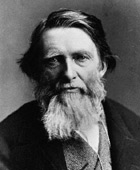John Ruskin , English author and art critic, born in London. Son of a wealthy wine merchant, he was brought up in a cultured and religious family, but his mother's over protectiveness undoubtedly contributed to his later psychological troubles. On his frequent trips in Europe, he took an artists's and poet's delight both in landscape and works of art, especially medieval and Renaissance. His first great work, Modern Painters (5 volumes, 1843-60), began as a passionate defence of Turner's pictures, but became a study of the principles of Art. In The Seven Lamps Of Architecture (1849) and The Stones Of Venice (1851) he similarly treated the fundamentals of architecture. These principles enabled him, incidentally, to appreciate and defend the Pre-Raphaelites, then the target of violence and abuse. To Ruskin the relationship between art, morality and social justice was of paramount importance and he increasingly became preoccupied with social reform. His concern inspired, among others, William Morris and Arnold Toynbee, whilst in the practical field he founded the Working Men' s college (1854) and backed with money the experiments of Octavia Hill in the management of house property. He advocated social reforms which later were adopted by all political parties old age pensions, universal free education, better housing.
Gothic was for Ruskin the expression of an integrated and spiritual civilisation; classicism represented paganism and corruption; the use of cast iron, and the increasing importance of function in architecture and engineering seemed to him a lamentable trend. He was Slade Professor of art at Oxford (1870-79) and (1883-84). His later works, eg. Sesame and Lillies(1865), The Crown Of Wild Olives (1866) and Fors Clavigera (1871 -74), contain the programme of social reform in which he was so interested. Ruskin married (1848) Euphemia (Effie) Gray (the child of whom he had written The King Of the Golden River) but in 1854 the marriage was annulled and Effie later married Millais. Ruskin did not marry again, although on occasions he fell in love with girls much younger than himself and his last disappointment over Rose la Touche contributed to his mental breakdown which caused him to spend his last years in seclusion at Brantwood on Lake Coniston, where he wrote Praeterita, an unfinished account of his early life. Much of his wealth he devoted to the 'Guild of St. George', which he founded, and other schemes of social welfare.
Source: Barry Jones Dictionary of World Biography. 1998
|






